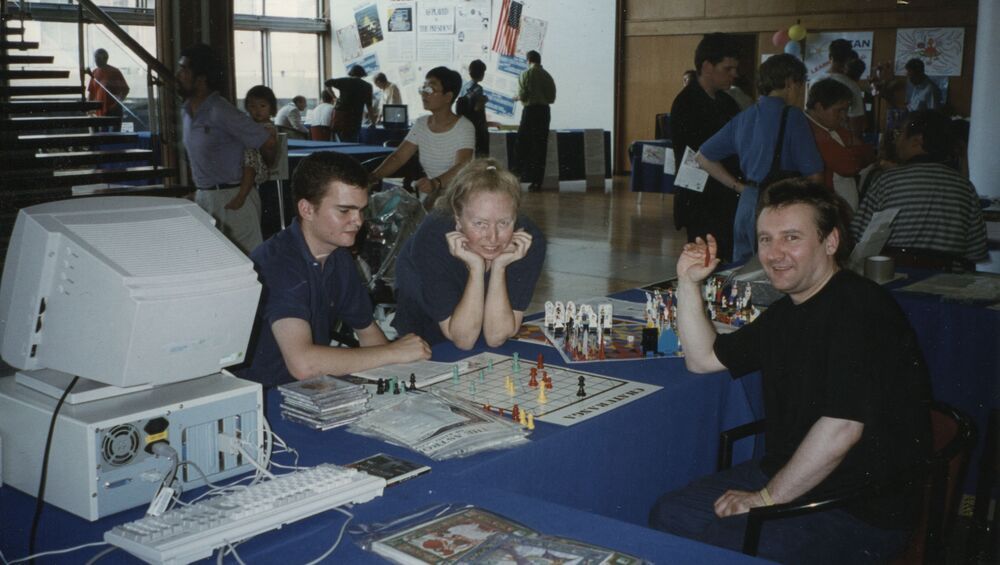OEC promoting STEM education in Nigeria.
Natural language processing is on the cusp of changing our relationship with machines forever.

Code of the Wild (Documentary) at Hello Tomorrow in Paris.
www.codeofthewild.org to watch the trailer and explore the film.
George Church, Antonio Regalado, and Josiah Zayner discuss designer babies, moratorium on human germ line engineering, and the future of the genomic revolution with Jane Metcalfe, co-founder of Wired Magizine and founder of Neolife (https://neo.life/)
___________________
CONNECT WITH US:
codeofthewild.org.
facebook.com/CodeoftheWild.
@CodeoftheWild (twitter)
@CodeoftheWild (Instagram)
Produced By.
www.RhumblineMedia.com.
Cody Sheehy.
Samira Kiani
Hallucinogens, neuro-immunology and the microbiome — convergent approaches in mental healthcare — mike wang, johns hopkins university.
Mike Wang, is a neuro-psychiatric researcher and adjunct teaching faculty in neuroscience at the Johns Hopkins Krieger School of Arts and Sciences.
Mike is one of the youngest principal investigators at the Johns Hopkins School of Medicine and currently leads a clinical trial examining how hallucinogenic levels of over-the-counter dextromethorphan might serve as the world’s first rapid acting oral antidepressant. (Those interested in the clinical trial for dextromethorphan can.
Mike’s work has been featured in academic journals like the American Journal of Psychiatry, as well as popular outlets like Psychology Today and VICE.
Mike received his graduate training in immunology at the Johns Hopkins Bloomberg School of Public Health studying rare viral encephalitides and neuro-immune determinants of depressive disorders.
University of the People is a tuition-free, American accredited, online college. Higher-education is now more accessible than ever. Apply now!


Blog — Bundex Film Archives coming to posthuman university.
As editor, sound engineer and roadie with director Bunny Dexter’s “Bundex Films”, the three of us (Eugene Smith was cameraman) travelled to various parts of the world making political, environmental and quirky documentaries during the first age of digital video. Bunny was also a judge at some international film festivals, and we actually won an award in Poland for one of our films. At NY film school, Bunny’s teacher was Marty Scorsese, who would call at Bunny’s flat sometimes when in London. We made two versions of a 3D hologram of Marty, of which he has one and I the other. After Bunny’s passing I inherited the huge shoulder-harnress digital camera which remains in my garage and has less capability than a modern smartphone, digital tape-decks and lots footage together with all rights, except for the lost Orson Welles tapes matter and story of his aristocratic Sicilian producer. More about this and other films later. I have boxes to sort through, and am sure I have forgotten some projects which will come as a surprise when I rediscover them. Will post at posthuman university side when sorted, this footage give unique insights from a period of very rapid evolution and transformation in film-making.
Documentaries include the Homeless and their Dogs, Gipsy persecution in Hungary, a study of Tattoo’s and Tattoo artists, Momento Mori – a film of an elderly lady after her death, and our pursuit of Cocoa plant agricultural sabotage in Brazil. There is unseen footage from these and other films, and interviews with Bunny before her death which I will edit together. She had an interesting life including appearances in Andy Warhol movies, and early success with a short film with Hollywood beckoning. Woody Allen was in her NY film school class, and many of her friends went on to become big stars, but B was too much of a socialite, and was unable to get her screen plays produced. At least one political biography that I have is very good, I might update it for sub-Hollywood production in the future. Anyway, Bunny had an interesting “career” and was close friends with Yoko & John Lennon from her guerrilla art days, Jimmy Hendrix, also Graham Chapman and some of the Pythons.

Neil Tyson is a man to listen to!!
Check out his documentary series: COSMOS.
Like.
Welcome back to the Daily Aviation for a new documentary video about the DARPA/USMC Ultra Heavy-Lift Amphibious Connector (UHAC) based on the Captive Air Amphibious Transporter (CAAT) project. This video also feature the US Landing Craft Air Cushion (LCAC) and compares it to the UHAC project.
Footage credit: US marine, derivative work by the daily aviation.
Thumbnail credit: US marine, derivative work by the daily aviation.
Voice, text and video editing belong to The Daily Aviation, any use of these content without permission is forbidden.
Don’t forget to subscribe us on Facebook or Twitter.
https://www.facebook.com/DailyAviationArchive.
Tweets by DailyMDA
You have a question or you would like to send us footage. Send us a message.
Chair emeritus, SETI institute — the search for extraterrestrial intelligence.
Dr. Jill Tarter is Chair Emeritus for SETI (Search for Extraterrestrial Intelligence) Research at the SETI Institute, a not-for-profit research organization whose mission is to explore, understand, and explain the origin and nature of life in the universe, and to apply the knowledge gained to inspire and guide present and future generations.
Dr. Tarter received her Bachelor of Engineering Physics Degree with Distinction from Cornell University and her Master’s Degree and a Ph.D. in Astronomy from the University of California, Berkeley. She served as Project Scientist for NASA’s SETI program, the High Resolution Microwave Survey, and has conducted numerous observational programs at radio observatories worldwide. Since the termination of funding for NASA’s SETI program in 1993, she has served in a leadership role to secure private funding to continue the exploratory science. Currently, she serves on the management board for the Allen Telescope Array, an innovative array of 350 (when fully realized) 6-m antennas at the Hat Creek Radio Observatory, it will simultaneously survey the radio universe for known and unexpected sources of astrophysical emissions, and speed up the search for radio emissions from other distant technologies by orders of magnitude.
Dr. Tarter’s work has brought her wide recognition in the scientific community, including the Lifetime Achievement Award from Women in Aerospace, two Public Service Medals from NASA, Chabot Observatory’s Person of the Year award (1997), Women of Achievement Award in the Science and Technology category by the Women’s Fund and the San Jose Mercury News (1998), and the Tesla Award of Technology at the Telluride Tech Festival (2001). She was elected an AAAS Fellow in 2002 and a California Academy of Sciences Fellow in 2003. In 2004 Time Magazine named her one of the Time 100 most influential people in the world, and in 2005 Dr. Tarter was awarded the Carl Sagan Prize for Science Popularization at Wonderfest, the biannual San Francisco Bay Area Festival of Science.
Dr. Tarter is deeply involved in the education of future citizens and scientists. In addition to her scientific leadership at NASA and SETI Institute, Dr. Tarter was the Principal Investigator for two curriculum development projects funded by NSF, NASA, and others. The first, the Life in the Universe series, created 6 science teaching guides for grades 3–9 (published 1994–96). Her second project, Voyages Through Time, is an integrated high school science curriculum on the fundamental theme of evolution in six modules: Cosmic Evolution, Planetary Evolution, Origin of Life, Evolution of Life, Hominid Evolution and Evolution of Technology (published 2003).